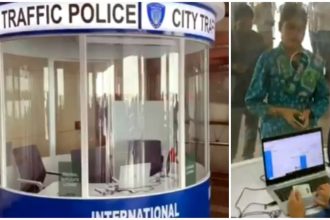Multiple bombings rocked Kabul Friday, killing at least 35 people and wounding hundreds more in the first major attacks in the Afghan capital since the announcement of Taliban leader Mullah Omar’s death.
The explosions, which devastated buildings and overwhelmed hospitals with casualties, mark the deadliest day in Kabul since the end of the NATO combat mission in December.
In the first attack, a powerful truck bomb tore through the centre of Kabul just after midnight on Friday, killing 15 civilians and wounding 240 others.
Less than 24 hours later, at least 20 Afghan cadets were killed when a suicide attacker dressed in police uniform blew himself up at the entrance of Kabul Police Academy.
The Taliban distanced themselves from the first bombing that struck near a Kabul military base — as they usually do in attacks that result in a large number of civilian casualties.
But the insurgents were quick to claim responsibility for the second attack, which marks a serious breach of security at a premier training institute for Afghan security forces.
Explosions and gunfire also erupted close to the airport on Friday evening, apparently targeting an area near foreign coalition bases, but there were no immediate reports of casualties.
Military jets were heard flying over the centre of Kabul shortly after the explosions.
The carnage underscores the volatile security situation in Afghanistan amid a faltering peace process with the Taliban as Afghan forces face their first summer fighting season without full NATO support.
Friday’s bombings are the first major attacks after Mullah Akhtar Mansour was last week named as the new Taliban chief in an acrimonious power transition after the insurgents confirmed the death of longtime leader Mullah Omar.
Observers say the escalating violence demonstrates Mullah Mansour’s attempt to boost his image among Taliban cadres and drive attention away from internal divisions over his leadership.
“The new wave of attacks is a tactic by the Taliban’s new leadership to show they are capable, potent and operational,” said security analyst Abdul Hadi Khaled.
“The demise of Mullah Omar divided the movement and affected the moral of their ground fighters. Hitting Kabul with a wave of powerful attacks is a way of showcasing their strength.”
Fatal academy bombing
On Friday evening, a suicide attacker dressed in police uniform blew himself up at the entrance of Kabul Police Academy, killing at least 20 Afghan cadets who were returning after their two-day weekend.
The bomber managed to place himself in a queue as police trainees were waiting to be searched before entering the academy, said a senior Afghan intelligence official, requesting anonymity.
“The attacker was wearing police uniform… when he detonated his explosives, 20 cadets were killed and 20 more were wounded,” the official told AFP.
Anguished relatives of cadets gathered near the academy, which was cordoned off by heavily-armed security officials as ambulances with wailing sirens rushed to the scene.
Another police official confirmed that toll while a third senior security source told AFP that 25 cadets were killed.
The academy in west Kabul is a premier training institution for police forces in Afghanistan, with between 2,000 and 3,000 cadets graduating every year.
Zabihullah Mujahid, a spokesman for the Taliban — who were toppled from power in the 2001 US invasion of Afghanistan — told AFP the insurgent group was behind the attack.
Less than 24 hours earlier
Earlier Friday, a truck packed with explosives detonated near an army base in the neighbourhood of Shah Shaheed, rattling homes across the city, ripping off the facades of buildings and leaving scattered piles of rubble.
The force of the explosion just after midnight created an enormous crater in the road, around 10 metres (30 feet) deep, and destroyed the boundary wall of the base, although no military casualties were reported.
“The death toll from the attack… has risen to 15,” deputy presidential spokesman Sayed Zafar Hashemi told AFP, adding that “240 people have been wounded — including women and children”.
The health ministry said the number of wounded could run even higher, with most suffering injuries from flying glass.
Kabul Police Chief General Abdul Rahman Rahimi said officials were searching for anyone trapped under the mangled concrete debris.
Soldiers erected a security cordon around the military base close to Shah Shaheed, a largely middle-class civilian residential area with no major foreign presence.
The wounded were overwhelming city hospitals, officials said, with reports emerging of blood shortages and urgent appeals for donors circulating on social media. (AFP)





